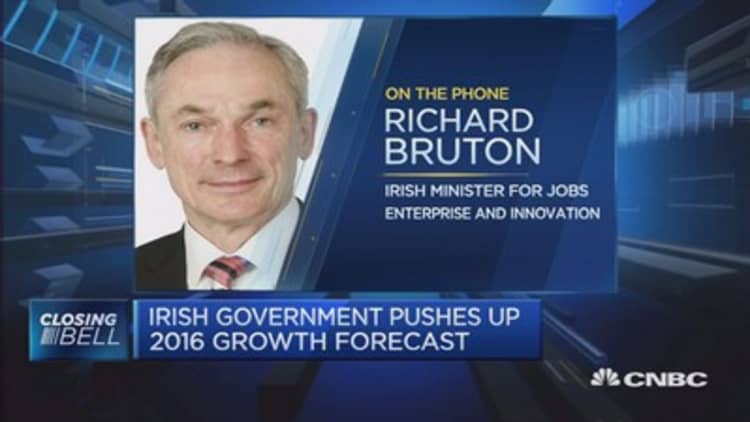Michael Noonan, Ireland's finance minister, delivered a budget on Tuesday which was notable for slight concessions on austerity, ahead of an expected election.
Ireland was brought to its knees in 2011 thanks to a near-collapse of its banking system. After being bailed out by its fellow euro zone countries, the International Monetary Fund and the European Central Bank to the tune of 85 billion euros ($96 billion), it has had to introduce a tough series of taxes and austerity measures.
In his 2015 budget, Noonan, whose Fine Gael party has lost ground in recent polling, announced what it hopes are vote-winners including a cut to the unpopular Universal Social Charge (known to many as the "bailout tax"), and cuts to taxes for the self-employed and entrepreneurs.
Taoiseach Enda Kenny has previously said there would be an election in spring 2016, but there is now speculation in Ireland that this might be brought forward to November of this year as the fallout from inquiries into the banking crisis, and the purchase of some of the assets in its bad bank, continues.
Still top of the bailout class?
Ireland's recovery from the bailout era has led to it being dubbed a poster boy for austerity, particularly when compared to more recalcitrant Greece. There is no doubt that its economy is doing better on most measures, with unemployment below 10 percent and gross domestic product (GDP) growth of 6 percent this year expected by the government. Most recently, it recorded the best composite PMI, a key measure of economic activity, in the euro zone for September.
Read More Ireland to increase capital spending to keep up with recovery
Yet critics warn that its debt-to-GDP ratio of 108 percent at the end of 2014 is still too high.
Double Irish dilemma
One of the reasons Ireland's recovery has been so promising is its attractions to international investment – which include a low corporation tax regime and the opportunity to avoid tax on European sales via a maneuver known as the "double Irish".
The government is now clamping down on this after negative attention from the Organization for Economic Co-operation and Development and the European Union, and is expected to announce more details of how its corporation tax regime will work in practice. This is likely to include firms being made to disclose more information about their operations outside the country.
Richard Bruton, the Irish minister for jobs, enterprise and innovation, emphasized Ireland's commitment to retaining low taxes for businesses on Tuesday.
"We make no apologies for having a competitive and low corporate tax rate. We believe that is the right approach for a small, open economy like our own… We will continue to have that as part of our core tax offering," he told CNBC.

Pre-election pledge
With both Fine Gael and coalition partners Labour losing out to Sinn Fein and politicians with no party affiliation in the polls, Noonan has to address complaints from ordinary people that his government has placed too much emphasis on big business and the wealthy.
Measures expected include a small increase in weekly pension payouts, the extension of free GP care, a tax credit for the self-employed, and the gradual reduction of the detested USC.
Follow us on Twitter: @CNBCWorld


